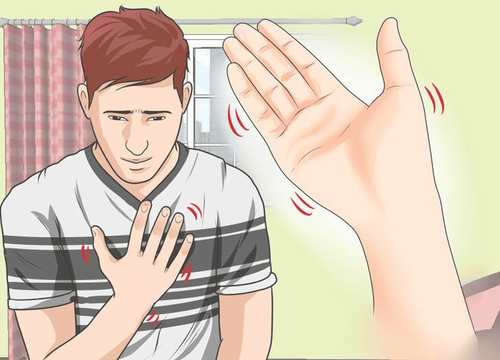This is an automatically translated article.
Living with lupus can take a toll on a person's emotional and mental well-being. Whether you've just been diagnosed with lupus, or you've been living with it for years, you've experienced both mental and physical difficulties like difficulty concentrating or problems sleeping. You may also be feeling grief, fear, anxiety, and depression. These conditions are relatively common in lupus patients. Understanding where they come from can help you learn skills to live with them.
1. Where do these feelings come from?
Emotions associated with lupus can have many causes, including:
As a result of your illness or unwanted effects of the treatments you're going through. Loss of self-esteem due to visible symptoms such as facial rashes, weight gain due to corticosteroids (often used to treat lupus). Limitations in work and activities: Pain, fatigue, and other symptoms can make it difficult to do the things you love. Illnesses or treatments that require you to cut back on your current job or even leave your job altogether. This can take away the joy you get from your job, the goals you're pursuing, and affect your income. Pain, fatigue, and other physical symptoms: Simply living with the pain and symptoms of Lupus every day can be devastating, frustrated, even hopeless. Social distancing: When you're feeling bad or need to use all your energy just to get through the day, engaging in social activities can be the first thing you do. . Concerns about changing your appearance can also make you feel more socially awkward.

Người mắc bệnh lupus bị phát ban trên khuôn mặt sẽ làm mất tự tin về ngoại hình
Uncertainty about the future: Having a chronic illness, one in which the doctor can't predict the future, can cause uncertainty and anxiety. You may wonder how the disease will progress, whether you will be able to live independently, or how you will manage physically and financially. Difficulty in family relationships: Lupus can make it difficult to take care of your home or family members the way you want or should. Because the disease can come and go and often show no outward signs, your family may not understand why you can't do the things you used to do. They may even question whether you are imagining the illness?
2.Effects on mental health in patients with lupus erythematosus
Sometimes, mental and emotional effects in lupus patients may be related to the disease process itself or to the medications being used to treat it. Common problems that may be related to the disease include:
Cognitive dysfunction: Many people with lupus have problems such as forgetfulness or difficulty thinking. They may describe these problems as “a feeling of being in a fog” or as being “in a fog.” These problems appear when the disease increases, or becomes rampant. However, it is important to distinguish cognitive problems from one of the symptoms of depression.
Depression and anxiety: This can happen as a psychological reaction to having lupus or a side effect of treatment. They can also be a direct consequence of the pathological process. It is often difficult for doctors to categorize specific causes of depression and anxiety in patients with lupus.
Mood swings and personality changes: People with lupus can experience unpredictable changes in mood and personality. It may include feelings of anger and irritability. These may be caused by disease or in some cases may be caused by the use of corticosteroid medications.

Bệnh nhân có thể bị trầm cảm và lo âu ở bệnh nhân Lupus ban đỏ
3. Where can you find support for emotional changes caused by Lupus?
If you are experiencing any of the above problems, it is important that you discuss them with your doctor. Your doctor can help you find a solution or possibly change the lupus medication you're taking. Or your doctor may add medications to treat problems like anxiety and depression. Your doctor may also refer you to a mental health professional, who will be able to help you take additional steps to better treat emotional problems caused by lupus.
4. What can you do to help yourself?
There are a number of steps you can take to help yourself better adapt to lupus including:
Educate yourself - and others: Learn as much as you can about the disease and how to treat it. treat. Share the information with friends and family members to help them better understand the disease and how it affects you. Their support is important to make disease control and management easier.
Get used to a healthy lifestyle: Exercise regularly, stick to a healthy, balanced diet, get enough rest and avoid alcohol. Especially if you are depressed then you should absolutely not drink alcohol. Alcohol is a natural depressant and it can significantly increase the severity of depression and its symptoms.
Learn stress management skills: living with a chronic illness is stressful. A mental health professional can show you techniques for dealing with stress such as muscle relaxation, or teach you meditation techniques, which you can use regularly to cope. cope with the stress of lupus. Other stress relievers you can try include listening to soothing music, taking a warm bath, going for a walk, or doing some gentle exercise.

Hãy tập luyện đêu đặn, tuân thủ một chế độ ăn uống cân bằng và tránh uống rượu để giúp mình thích nghi với bệnh lupus tốt hơn
Do things you enjoy: Lupus can limit some of the activities you normally do. So it's important to find for yourself things you enjoy doing that fit your illness and take the time to do them. These activities can be as simple as reading a book, doing things that interest others or family members.
Seek support: When you feel down, talk to a trusted friend or psychologist. Consider joining a support group - a group of patients who are going through the same Lupus treatment as you. To find this group, talk to your doctor or health counselor.
Appreciate yourself: Even though you have lupus, you have many other likable traits, such as beautiful eyes, a friendly smile, musical talent, or a passion for cooking. Don't make Lupus the sole concern of your life. Focus on your talents and strengths to settle into a normal life and live with Lupus long-term.
Vinmec International General Hospital is a high-quality medical facility in Vietnam with a team of highly qualified medical professionals, well-trained, domestic and foreign, and experienced.
A system of modern and advanced medical equipment, possessing many of the best machines in the world, helping to detect many difficult and dangerous diseases in a short time, supporting the diagnosis and treatment of doctors the most effective. The hospital space is designed according to 5-star hotel standards, giving patients comfort, friendliness and peace of mind.
Please dial HOTLINE for more information or register for an appointment HERE. Download MyVinmec app to make appointments faster and to manage your bookings easily.
Reference source: webmd.com












